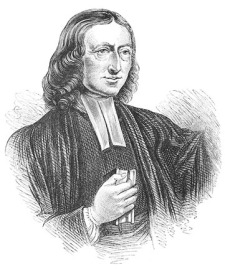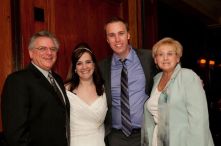This is the second part of a four-part series in which I reflect on my journey toward becoming one of Wesley’s people—a pastor in the United Methodist Church. You can read part one, I’m not Crazy, right here.
When my mom asked me what I wanted for Christmas, I sent her an Amazon wish list with three items on it: Calvin’s Institutes, Fred Sander’s theological biography on John Wesley, John Wesley: The Heart Renewed in Love, and a collection of John Wesley’s writings.
Nerd alert!
While at Wheaton, I learned to love reading books by dead people. Throughout my program, I had at least one historical mentor, and it’s a practice I’ve chosen to continue. For 2014, and most likely beyond that, I’ve chosen to read Wesley and Calvin together, in conversation with each other.
As I’ve sat ringside with these men, watching them duke it out with their opponents, I’ve come to appreciate each more and more—and to have burning questions for each, too.
Here are the three things I’ve learned while reading Wesley and Calvin.
 1: I want to be friends with Wesley. I’d avoid Calvin at parties. Here’s the deal: Calvin is kind of a jerk. He likes to insult his opponent’s intelligence and character, and is kind of reminiscent of the cool kids in high school that were just mean to everyone. (His favorite word for those who disagree with him is ‘miscreant,’ which you have to hand it to him, is a pretty cool word.) But Calvin is a jerk, and I think I’d feel awkward if someone said, “Hey, you’re friends with Calvin, right?”
1: I want to be friends with Wesley. I’d avoid Calvin at parties. Here’s the deal: Calvin is kind of a jerk. He likes to insult his opponent’s intelligence and character, and is kind of reminiscent of the cool kids in high school that were just mean to everyone. (His favorite word for those who disagree with him is ‘miscreant,’ which you have to hand it to him, is a pretty cool word.) But Calvin is a jerk, and I think I’d feel awkward if someone said, “Hey, you’re friends with Calvin, right?”
Meanwhile, Wesley is just a cool guy. He’s now been added to my list of people that I’d like to eat a meal with if they could come back from the dead. Wesley is intense, but personable; focused, but understanding; passionate, but charitable. Of course, Wesley did just hate Calvinism, but he also once said, “I think on justification just as I have done any time these seven and twenty years, and just as Mr. Calvin does. In this respect I do not differ from him a hair’s breadth.”
2: Wesley is far more charitable than Calvin. Wesley never wrote a systematic theology—which is why some say, and rightly, there is not a theological backbone in the Methodist tradition. Wesley was a practical man, so the textbook for his movement were his Standard Sermons. Practical theology for a very practical people.
In that, Wesley is a very charitable man. That’s not to say that he’s without fiery retorts for those who differ from him. (OK, so he called Calvinism a heresy once…) But for the most part, Wesley’s fire was for people who distorted the Gospel—mostly preachers who taught a dull morality in churches instead of a robust, Gospel-centered way of living. He was rather charitable toward men and women of other traditions, and you have to remember, wasn’t setting out to start a new denomination as much as he was trying to renew the Church at that time.
3: There is something to be said for organization, clarity, and yes, systematic theology. Calvin’s contribution in the Institutes is an ordered, systematized theological way of thinking for Christians. Wesley’s lack thereof makes some of his thinking hard to understand; even the most intelligent Wesley scholars struggle to see what he means by ‘Christian perfection.’ (See Sander’s book for an excellent chapter on that!) It’s also hard to grasp what he was trying to go for when he teaches on works of righteousness.
Sometimes a book with bullet points and an outline is just easier to think through. I think the lack of a systematic approach, a blueprint, if you will, leaves the Methodist movement prone to theological wishy-washy-ness. (It may also explain why The Book of Discipline, our guiding document as a movement and a church, is so vague!)
So there you have it. If you haven’t, I’d again challenge you to read something by Wesley. A suggestion: try Wesley’s sermon, The Lord Our Righteousness, which is number 20 in the Standard Sermons. Don’t cast a stone without giving him a chance, and this is a sermon that, I think, far outweighs most of the historical sermons I’ve read in the Reformed tradition.
What do you know about John Wesley? Have you ever read anything by him? What has stopped you from reading him?
 My boss is one of my closest friends and most trusted counselors. I interned for Rick throughout my years at Moody, and he performed my wedding ceremony. We’re close, and had always talked about working together—though to be truthful, I never thought it would happen. But it did, and I really enjoy working for him.
My boss is one of my closest friends and most trusted counselors. I interned for Rick throughout my years at Moody, and he performed my wedding ceremony. We’re close, and had always talked about working together—though to be truthful, I never thought it would happen. But it did, and I really enjoy working for him.